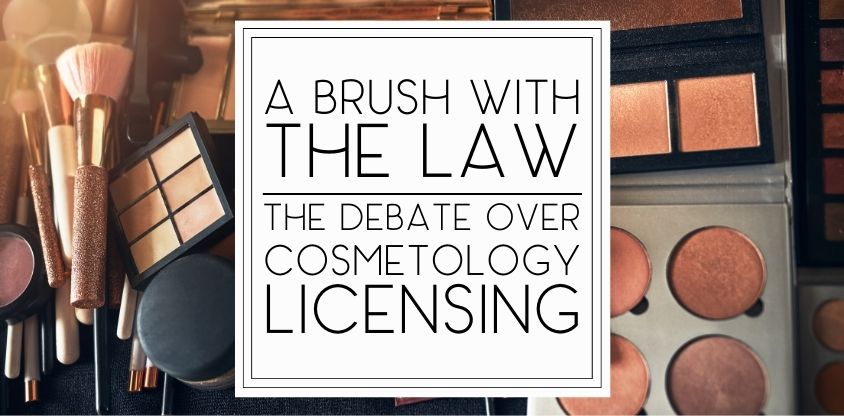A Brooklyn-based makeup technician is making headlines for defying state regulations and operating without a cosmetology license. “Jasmine” (no last name given) argues that the money and time it takes to obtain a license are beyond her reach as a self-taught makeup artist facing financial troubles. Jasmine insists that she knows all she needs to know about her field and that when you have as much experience as she does, a cosmetology license is unnecessary.
In some ways, I sympathize. None of us should be forced to learn skills we don’t need. I get it. I really do.
But unlicensed people don’t get to argue that professional licensing shouldn’t exist. Without a license, Jasmine doesn’t have the training to understand all of the risks an unlicensed person in a salon poses to the general public or the massive liability they pose to the salon owner.
It’s true that licensing requirements were heavily lobbied for and influenced by for-profit beauty academies looking to bloat their bottom line, but regulations requiring education and licensing were also created to attempt to solve problems and establish a shared value system around objectively good practices.
While each state has different regulations, most overlap in a few key areas. By and large, every regulated state agrees:
- Clients have the right to expect a clean and safe salon experience.
- Those seeking to enter the beauty industry have the right to an education sufficient to guarantee that they can competently perform their duties in the salon while protecting themselves and the public from communicable disorders.
- Professionals and clients have the right to a clean, compliant workplace.
- As an industry, professionals are obligated to ensure all of the above or face penalties including fines, license suspensions, and—in extreme cases—permanent license revocation.
Our state board regulations ensure that professionals and clients alike understand how and why we disinfect our tools between clients, what the standards for salon cleanliness are, what licensing documentation they should expect to see, and where that documentation should be posted in the salon.
Our licensing requirements guarantee that professionals can—at a very minimum—respond to common first-aid situations (cuts, burns, falls) capably, mix and use state-approved disinfectants properly, and identify symptoms of communicable skin disorders. They also ensure that we understand and practice Universal Precautions.
These regulations aren’t designed to necessarily serve us; they’re designed to protect the public, including the business owners who are legally liable for anything a service provider does in their facility.
I agree that experience isn’t worthless. However, just because you’ve been doing something for years doesn’t mean you’ve been doing it correctly or safely. Without professional training, you won’t learn that until you happen to make a very, very big mistake (like causing a pink-eye outbreak because you didn’t know not to reuse mascara wands).
You don’t know what you don’t know.
State Board licensing standards and regulatory requirements are the methods by which our state legislators reassure the public and our employers that we should know what we’re doing—and that if we screw up, there are mechanisms in place to hold us professionally liable for it. The public shouldn’t have to rely on local courts to determine gross negligence when a framework can be provided that guarantees a professional who acts recklessly or carelessly will face professional consequences, like losing their ability to ever legally work in a salon again. These regulations provide protection against malpractice. They’re meant to strongly incentivize licensed professionals to play by the rules and take their obligations to their community seriously. You aren’t supposed to like them.
Instead of arguing that licenses shouldn’t exist, Jasmine should be fighting for the creation of smaller licenses for specialized professions. There’s no denying that makeup artistry is a separate profession from cosmetology. Makeup artists could go their entire careers without ever having to learn anything about mixing chemicals, using and disinfecting sharps, or applying hot wax to a client’s skin. These are things makeup artists don’t do.
Precedents for crafting smaller, more specific licenses already exist. Various states in the U.S. have introduced specialized licenses for services such as hair braiding and body wrapping, acknowledging that these professionals have different needs compared to full cosmetologists. This move towards specialized licenses recognizes the unique skills and training required for specific services, making it more accessible for professionals to enter the industry without undergoing extensive training irrelevant to their specialization.
Does a professional who plans to specialize in braiding need to spend 300 hours learning how to do manicures and pedicures? No. Because that isn’t part of their job. Why should a makeup artist be required to learn how to do hair and nails?
It’s tough being caught in the catch-22 of needing to work to pay for the licenses but needing the license to legally work. Instead of limiting herself to keeping her makeup business as a side-hustle, and risking legal repercussions if caught, she needs to think outside the box and find a legit way to get her needs met and her career on the best possible path.
If I were in Jasmine’s position, I would petition for alternative certification programs, advocate for specialized licensing, and collaborate with the board and other industry peers. It’s far past time for our industry to find innovative, accessible pathways to professional legitimacy that align with individual career goals and legal requirements.








